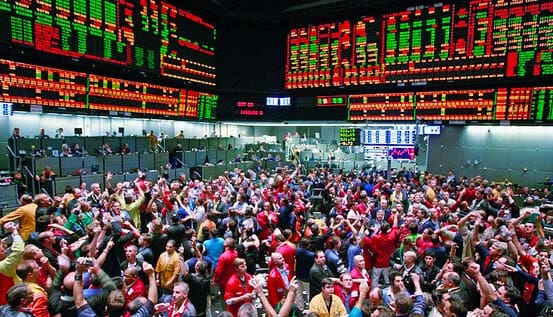Join 307,012+ Monthly Readers
Join 307,012+ Monthly Readers
Free Banker BlueprintSales & Trading (S&T)
An Overview of Sales & Trading, Including Careers, Roles, Salaries, and Exit Opportunities
What Is Sales & Trading?
Sales & Trading Definition: Sales & Trading is the division of an investment bank that pitches clients on different trading ideas (stocks, options, bonds, currencies, commodities, etc.) and then executes these trades or “makes markets” for the clients, earning money based on fees, commissions, and the bid-ask spread on trades.
Sales & Trading (S&T) is completely different from groups such as investment banking (IB) because investment bankers work on deals that affect entire companies, such as mergers, acquisitions, and capital issuances; by contrast, salespeople and traders work with securities that represent small percentages of companies.
The entire process of pitching trades to clients, executing them, and making markets may sound easy, but it gets complicated due to the volumes involved.
If you want to buy 100 shares of Microsoft, you can log onto an online brokerage and do it; but if you want to buy 500 million shares, you need to do it very carefully and gradually over time, or you’ll “move the market” and affect the underlying share price.
Salespeople and traders step in to fulfill this role, dividing larger orders into smaller chunks, setting up buying schedules, and connecting buyers and sellers at their targeted prices.
They earn money via the fees charged on executed trades, but they can also earn a profit directly by buying and selling securities to “make markets” for clients.
Sales & Trading Recruitment
At a high level, the recruiting process for entry-level S&T candidates is similar to investment banking. The steps typically include:
- Networking via alumni or LinkedIn/email to win interviews.
- Complete an online application including screening questions.
- Then, complete a phone-based or in-person interview.
- Finally, attend a Superday if you’re in the U.S. or an assessment center if you’re in the EMEA region.
That said, some aspects of the recruitment process are specific to S&T roles.
Sales & Trading Resumes
To have a realistic shot at landing a job in Sales & Trading, you’ll need to be able to point to a sequence of previous internships.
Then, you need to present that experience effectively on your resume. Our sales and trading resume template will help.
In S&T, employers want to see strong evidence for a passion for the financial markets. Your resume should reflect this.
Networking For Sales & Trading Jobs
Most of the advice in our investment banking networking article will apply, albeit with these caveats:
- Don’t disturb traders or salespeople during market hours (especially no around market open or close).
- Cold calls and emails tend to be less effective because the large banks dominate sales & trading and it’s harder to reach decision makers directly.
Sales & Trading Interviews
Most interviews for sales and trading will start with a variation of the “walk me through your resume” question.
From there, questions about the markets and investment/trade ideas will feature prominently.
You don’t want to walk into an interview and say that you “like to trade stocks” – you want to cite specific products that interest you, such as equity derivatives, or specific trading strategies that aren’t just buying and selling Microsoft or Apple shares.
Questions about math and programming could come up since they’re more important in S&T, but more so if you interview for trading roles instead of sales roles. You should also expect more brainteasers and “mental math” questions than in corporate finance and IB interviews.
For more information, please see our full coverage of sales & trading interview questions.

Agency Trading vs. Prop Trading vs. Flow Trading
There are two major types of trading, with the third being a hybrid:
- Agency Trading: You execute orders for the client – you’re merely an “agent” doing what he/she wants and do not have (much) freedom.
- Prop Trading: You are the principal and can make whatever trades you want, using your own money – within your trading mandate and risk limits. You can make a lot more money investing capital rather than simply earning commissions on trades.
- Flow Trading: a hybrid of the two, where you have clients but you also get to make some investment decisions.
There’s also the question of what you’re trading, with equity trading and fixed income trading being the major categories there.
Sub-groups within these two major categories include the options trading desk, the distressed debt desk, and the rates trading desk.
For the most part, large banks do not engage in proprietary trading anymore following the 2008 financial crisis and the reforms and regulations that came out of it.
Instead, they mostly stick to agency and flow trading and “make markets” for clients so that they can buy and sell at their desired processes.
On some desks, they also spend time designing more complex products for clients to trade, but this is more in the realm of what structurers do.

Sales & Trading Career Path
Sales & Trading features the familiar job titles and hierarchy of other banking and financial groups, such as:
- Intern or Summer Intern
- Analyst
- Associate
- VP
- Director or Senior VP
- Managing Director
As you move up, your salary and bonus will increase as you manage a larger book, but the work itself will not necessarily change much unless you move to the “management” side of S&T.
As a “management” MD, you don’t do much trading directly anymore, but you oversee the group and deal with strategic, hiring, and other personnel decisions.
The advantage is that your compensation will be more consistent; the disadvantage is that you lose the potential for outsized pay if you have a great year trading.

Sales & Trading Salaries & Compensation
At the junior levels, pay is not that much different from investment banker salary levels.
At hedge funds and prop trading firms, the pay varies more than in investment banking or private equity because firms’ returns are heavily linked to the market.
In general, you’ll start out in the low six-figure range and move closer to $1MM and beyond as you move toward the Partner-level.
S&T compensation may also be almost entirely or entirely performance based. So when things go well, you can make a lot, but when the economy tanks, you can earn nothing at all.
Sales & Trading Exit Opportunities
Sales & trading exit opportunities are more limited than in investment banking: you keep trading or you move to a different industry.
It’s difficult to move into private equity or corporate development coming from trading because the skill sets don’t have much overlap.
The longer you stay in the field, the harder it is to move elsewhere – so you should decide within your first year or 2 where you want to be.
On the sales side, you could move to a normal company and work in sales there more easily – selling products and stocks are different, of course, but overall sales is sales and it’s more transferable to other industries.

Sales & Trading Courses
Let’s not mix words: our courses are not at all geared toward sales & trading roles.
In general, you will not find many sales & trading courses online – mostly just interview guides – because the work on most S&T desks is very “ad hoc,” i.e., each desk has custom analyses and does things a bit differently.
This makes it difficult to acquire the skills via online videos or written guides because there isn’t necessarily one standard approach that you learn with repeated practice.
With that said, some of our Breaking Into Wall Street (BIWS) courses are applicable to parts of sales & trading:
- IB Networking Toolkit – This may be useful if you need email and call templates for networking purposes in any field
- Excel & VBA – You still use Excel and VBA in many trading roles, and automating your work always helps
- Core Financial Modeling – This provides an introduction to accounting, 3-statement modeling, valuation, and deal analysis; understanding the fundamentals could help in various S&T roles
- Advanced Financial Modeling – Parts of this course deal with topics such as convertible bond valuation and debt vs. equity analysis, which may be relevant for some S&T desks











